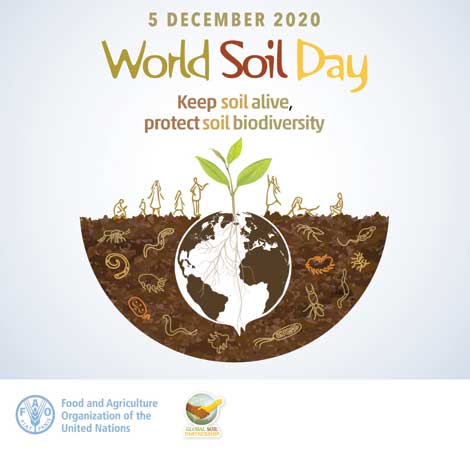

Soil is a living resource, home to more than one quarter (25 per cent) of our planet’s biodiversity, and its protection is of utmost importance to ensure the future of agri-food systems and the provision of key ecosystem services.
While there is increasing focus on the importance of biodiversity for food security and nutrition, especially above-ground biodiversity such as plants and animals, less attention is being paid to the biodiversity beneath our feet. Since 95 per cent of our food comes from soils, it is imperative that we keep them healthy by protecting the biodiversity that they hold so as to allow them produce more nutritious and safer food.
The 5th of December of each year marks World Soil Day in celebration of healthy soils for a food-secure future. This years’ campaign “Keep soil alive, protect soil biodiversity” urges us to focus our attention on the workers below ground — from tiny beneficial microbes like bacteria to agile millipedes and slimy earthworms — all of which contribute to processes that are indispensable to life on Earth.
Up to 90 per cent of living organisms live or spent part of their lifecycle in soils, yet we know only 1 per cent of this hidden universe. Soil organisms are responsible for many critical ecosystem processes, on which humans depend: from supporting plant growth, to storing carbon and being a vast reservoir for pharmaceuticals.
The Omani people throughout history have relied on using soil for residential and agricultural purposes to construct their homes, and to secure their food and subsistence needs respectively. According to studies conducted by the Ministry of Agriculture, Fisheries and Water Resources and The Food and Agriculture Organization (FAO), approximately 7 per cent of the Sultanate’s land is suitable for cultivation. Considering that soils are among the most important factors that contribute to increasing agriculture yields and income, the ministry has been studying various methods to improve the productivity and fertility of Oman’s soil. In addition, it has adopted measures which aim to preserve and conserve the health of soils in the face of a multitude of challenges which include, but are not limited to, climate change and soil salinity.
As various challenges continue to impede soil health and in turn food security in many parts of the world, FAO is encouraging the adoption of more resilient and efficient production systems such as Conservation Agriculture (CA) to prevent losses of arable land while regenerating degraded lands. If the world’s small-scale farmers are to continue achieving food security, soils must be protected in order to sustain agricultural production. For this, FAO promotes sustainable soil management through initiatives such as the Global Soil Partnership, which positions soils on the Global Agenda through promoting collective action and developing a strong interactive partnership based on enhanced collaboration and fostering synergies between all stakeholders.
Oman Observer is now on the WhatsApp channel. Click here



